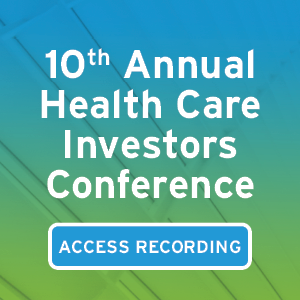 Not even a pandemic could derail the 10th annual Health Care Investors Conference (HCIC) by Bass, Berry & Sims and Deloitte. Meeting online is not what anyone would prefer, noted Angela Humphreys, Chair of the Health Care Practice Group and Co-Chair of the Health Care Private Equity Team, Bass, Berry & Sims, but for more than 150 attendees, the virtual conference offered many insights from health care executives and investors, as well as the experienced professionals from Bass, Berry & Sims and Deloitte.
Not even a pandemic could derail the 10th annual Health Care Investors Conference (HCIC) by Bass, Berry & Sims and Deloitte. Meeting online is not what anyone would prefer, noted Angela Humphreys, Chair of the Health Care Practice Group and Co-Chair of the Health Care Private Equity Team, Bass, Berry & Sims, but for more than 150 attendees, the virtual conference offered many insights from health care executives and investors, as well as the experienced professionals from Bass, Berry & Sims and Deloitte.
Humphreys also looked with optimism on 2021, she said, when she hopes to welcome everyone in person at the firm’s Nashville offices for the 2021 HCIC. An overview of the topics discussed is included below.
Health Care Policy Forecast
Looking at the impact of the 2020 U.S. election on health care, the focus should be on three C’s: COVID-19 response, health insurance coverage, and the U.S. Supreme Court, said Anne Phelps, Principal, U.S. Health Care Regulatory Leader, Deloitte.
Coverage is the area where the election could have the biggest impact on health care business, given the differences between the proposals of Trump and Biden campaigns, Phelps said. The proposals from the Trump administration focus on using greater flexibility in benefit design and state Medicaid waivers to increase coverage. Proposals from the Biden campaign would attempt to expand coverage through greater government involvement in insurance markets, such as a public option health plan or an expansion of Medicare eligibility to age 60.
Three policies that are likely to move forward no matter what the outcome of the election are data interoperability, pricing transparency, and furthering the shift of federal health care programs to value-based arrangements, Phelps said.
Infectious Diseases and Investing
Investors need to be aware of the business risk posed by infectious diseases. Experts are monitoring dozens of infectious diseases in animals that have the potential to crossover into human-to-human transmission as occurred with SARS CoV-2, the virus that causes COVID-19, said Dr. Richard Webby, Department of Infectious Diseases at St. Jude Children’s Research Hospital and the Director of the World Health Organization Collaborating Center for Studies on the Ecology of Influenza in Animals.
An estimated 30% of birds are carrying a virus, for example, so there are many potential sources of an outbreak, but it is very hard to predict where the next outbreak will come from, Dr. Webby said.
Health Care Transformation and Trends
In the conference’s first panel discussion, “Health Care Transformation and Trends in the Next New Normal – Accelerating the Future of Health,” panelists agreed that health care is still scratching the surface of the impact that technology can deliver. The discussion, moderated by Deloitte’s Phil Pfrang, Partner, Global Life Sciences and Health Care M&A Transaction Services Leader, highlighted how difficult self-disruption can be in health care. The system has evolved in ways that are favorable to incumbent companies, and that means the stakes are very high when a company or sector upends its business model.
Panelists discussed the example of data interoperability in depth. Integrating different types of health care data is one challenge. Bringing data together with data on social determinants of health – such as community stability, diet, education and housing – is another challenge. Business models also can affect efforts to improve interoperability, as some models rely on making exclusive use of collected data. The disruptors that propel interoperability forward may be consumer-focused companies that securely integrate all the different types of data that affect health. Consumers have shown their willingness to share data for tangible improvements in other areas, such as streaming entertainment, banking and retail.
The panelists agreed that data will drive improvements in health care that bend the cost curve and may even reduce the cost of care over the long term.
Health Care M&A Beyond 2020
The COVID-19 pandemic shifted the way both private equity investors and private companies viewed the transaction landscape, according to the panel discussion titled, “Market Dynamics, Emerging Opportunities and Value-Driven M&A Beyond 2020.” The initial focus as stay-at-home orders began in the U.S. in March was on ensuring sufficient liquidity to survive, by working with lenders and making use of federal loans through the CARES Act.
Pre-COVID-19, health care was a seller’s market focused on price and the timing and certainty of closing the transaction, panelists noted. Since March, both buyers and sellers have broadened their views. Private equity acquirers are exhibiting more flexibility beyond their core investment themes and preferred deal structures. The fundamental question is whether the business has shown resiliency to the pandemic’s impact. Private companies are running fewer sales processes designed to maximize sales price and prioritizing the right fit and structure instead.
Everyone on the panel, including moderator Humphreys, expects a high volume of health care transactions in the fourth quarter. Humphreys recently co-authored a Private Equity Dealmakers Guidebook for Healthcare M&A, which provides a deep dive into COVID-19-related considerations for PE buyers or platforms executing a deal process. Some deals that the pandemic slowed are now moving forward, and in some cases, sellers are accelerating their exit plans based on the possibility of tax code changes following the 2020 election.
The panelists also shared their picks for sectors that will be active for transactions in 2021: behavioral health; health information technology services, especially data analytics companies; companies that assist with value-based care; and companies that shift care from hospitals to outpatient or home settings.
For more information on this year’s conference, please click here.


